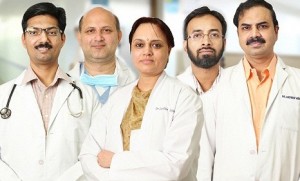 When we think of working in healthcare, most of us immediately think of doctors, nurses, and the training required for those jobs. However, there are other jobs in healthcare that are just as important, and each one has its own program of study.
When we think of working in healthcare, most of us immediately think of doctors, nurses, and the training required for those jobs. However, there are other jobs in healthcare that are just as important, and each one has its own program of study.
From a master’s degree to a bachelor’s degree, from health administration to medical laboratory science and everything in between, here are five great degree options for those who want to work in healthcare.
Doctor of Medicine (M.D.)
This is one of the more well-known careers for those interested in working in healthcare and becoming an M.D. takes at least four years, followed by internships and residencies. These usually last between three and eight years, making this a longer process. Doctors take the first two years to learn in-depth, before applying this knowledge hands-on. After the four years of intense study, a student will test for their medical license. Many schools offer this more traditional degree program, while also offering a variety of specializations.
Bachelor of Radiation Science Technology
Our world is becoming increasingly high-tech and the healthcare field is no exception to this rule. Online programs teach students about radiologic technology while helping students find an internship that fits them, while the more traditional route does the same thing. Online courses are also meant to be applied to existing degrees, allowing students to advance in their careers. Radiology is a rapidly growing field, and one that experts think will continue to be in high demand in years to come.
Bachelor of Science in Respiratory Therapy
If you are already working as a Certified Respiratory Therapist (CRT) or a Registered Respiratory Therapist (RRT), but are looking to advance your career, check out an online bachelor of science in respiratory therapy degree. Programs like these have been designed to help fill a niche. With a large number of senior citizens in our society, there is a high demand for healthcare, particularly when it comes to caring for the respiratory system. An online respiratory therapy degree can help you make a difference in the lives of countless patients.
To become a CRT or an RRT, you will need to get your associate’s degree and a license. Schools like the University of Cincinnati offer exciting programs in this and other subjects, including health administration and radiation science technology. Many online programs, including an online bachelor of science in respiratory therapy degree, are for people who are currently working in healthcare and are looking to learn more about the latest technologies or to just add to their existing body of knowledge. Because they are made for people currently working in healthcare, these online programs are typically short and to the point, though they could be completed before entering the workforce.
Master of Health Administration
A master of health administration is designed both for currently working professionals and people moving forward in their education. These programs focus on teaching students about the leadership needed in the healthcare industry and cover a wide range of topics from finances, healthcare quality, law, and economics. There is a lot to learn, but if you enjoy healthcare, management, finances, and public relations, this might be a degree worth looking into.
Nursing
With the right associate’s degree, you can become a nurse. However, a bachelor’s degree in nursing could give you both a competitive edge and some extra skills. A bachelor’s degree is also something that could be helpful if you think you might ever be interested in working in administration. Nurses are critical and are in a unique position to make a difference in people’s lives.
Some of these courses were created specifically for continuing education while others were not, but all of them offer unique challenges. If you are interested in working in healthcare, there are plenty of options available to you. Some are online and others are in a traditional classroom setting, but all of them offer a chance to learn, observe, and to make a difference.







